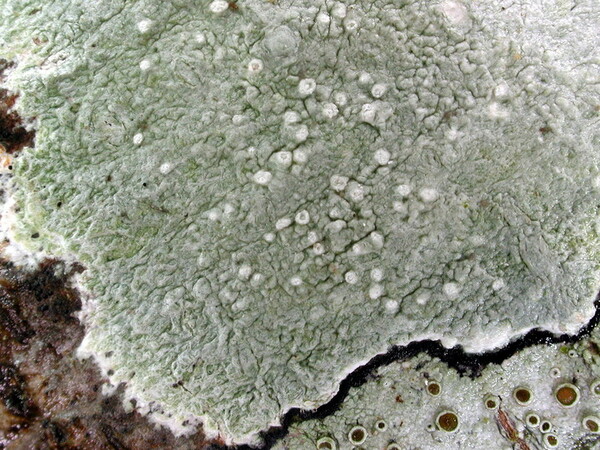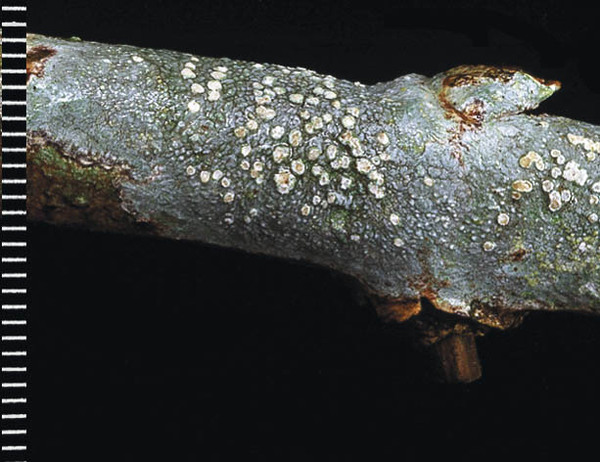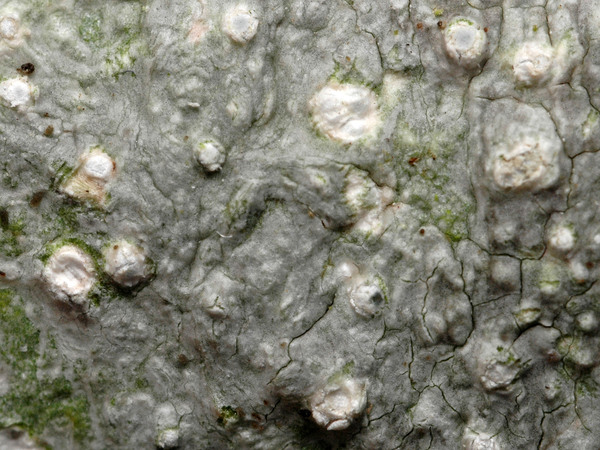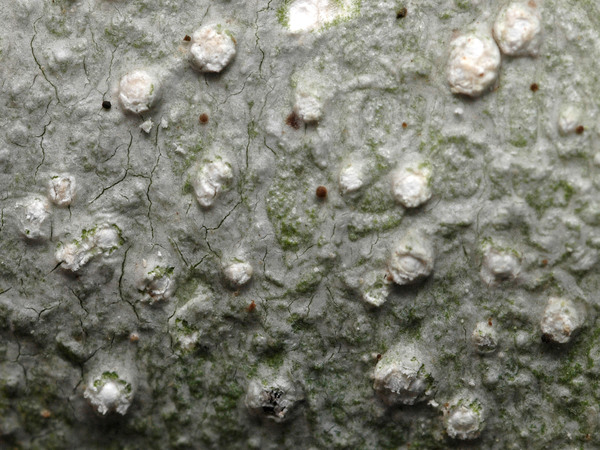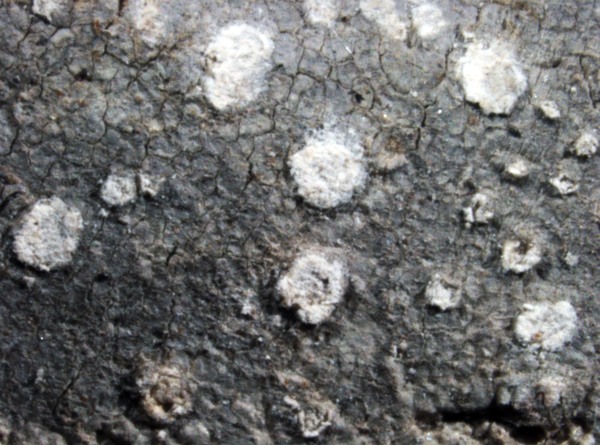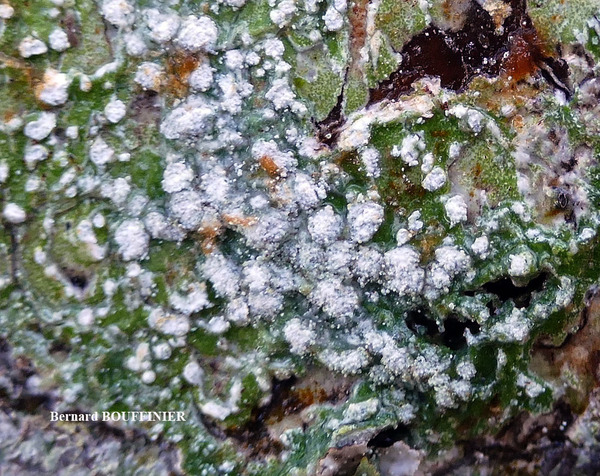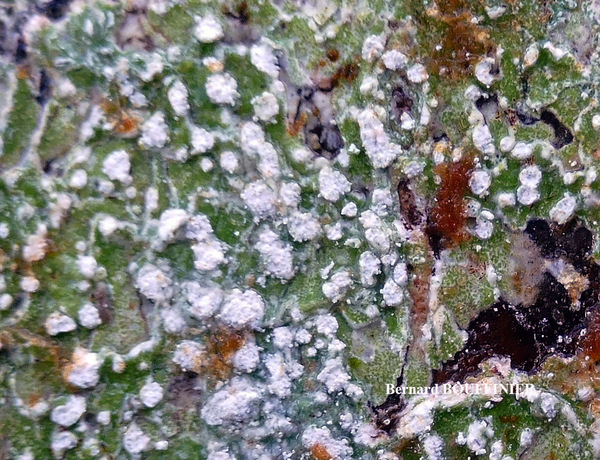Lepra multipuncta (Turner) Hafellner
in Hafellner & Türk, Stapfia, 104: 172, 2016. Basionym: Variolaria multipuncta Turner - Trans. Linn. Soc. London, 9: 137, 1808.
Synonyms: Pertusaria globulifera var. sorediata Mudd; Pertusaria leptospora Nitschke; Pertusaria multipuncta (Turner) Nyl.; Pertusaria sorediata C. Knight
Description: Thallus crustose, episubstratic, ash-grey to bluish grey, 1-3 mm thick, sometimes thinner, continuous to rimose, coarsely warted, usually well-delimited by a pale prothallus. Fruiting warts 0.5-1.5(-2) mm across, flattened, covered in white, granular soredia. Apothecia immersed in the fruiting warts (and hence visible only when these are sectioned), 1-2(-5) per wart, with a pale yellowish brown to blackish brown, white-pruinose, c. 0.5(-1) mm wide disc. Asci 1-spored, cylindrical, with thick, amyloid walls, Pertusaria-type. Ascospores 1-celled, elongate-ellipsoid to cylindrical, 90-180(-200) x 30-60(-70) μm, the wall up to 10 μm thick, uniform. Photobiont chlorococcoid. Spot tests: cortex and soralia K+ yellow-brown, C-, KC+ yellow, P+ bright orange-red, UV- or faintly glaucous. Chemistry: physodalic acid (major), protocetraric acid (traces).
Growth form: Crustose
Substrata: bark
Photobiont: green algae other than Trentepohlia
Reproductive strategy: mainly asexual, by soredia, or soredia-like structures (e.g. blastidia)
Most common in areas with a humid-warm climate (e.g. most of Tyrrenian Italy)
Commonnes-rarity: (info)
Alpine belt: absent
Subalpine belt: absent
Montane belt: rare
Dry submediterranean belt: extremely rare
Humid submediterranean belt: very rare
Padanian area: absent
pH of the substrata:
1 2 3 4 5
Solar irradiation:
1 2 3 4 5
Aridity:
1 2 3 4 5
Eutrophication:
1 2 3 4 5
Poleotolerance:
0 1 2 3
Altitudinal distribution:
1 2 3 4 5 6
Rarity
absent
extremely rare
very rare
rare
rather rare
rather common
common
very common
extremely common
Loading data...
Occurrence data
Predictive map
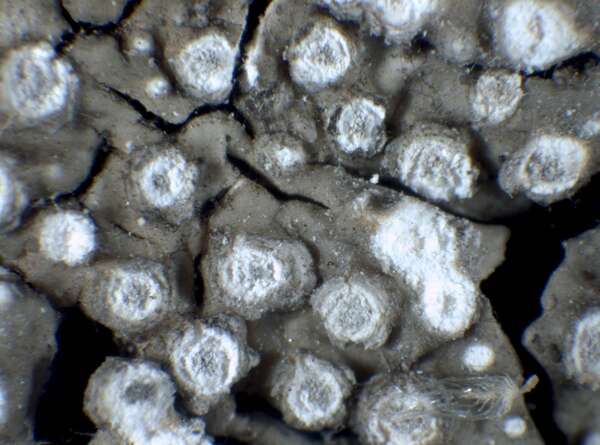
P.L. Nimis; Owner: Department of Life Sciences, University of Trieste
Herbarium: TSB (9478)
2002/05/14
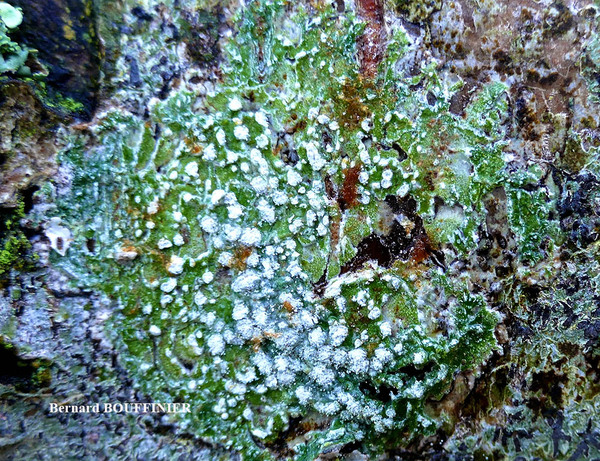
Bernard Bouffinier - Source: http://www.lichensmaritimes.org/index.php?task=fiche&lichen=440&lang=en
France, Dineault
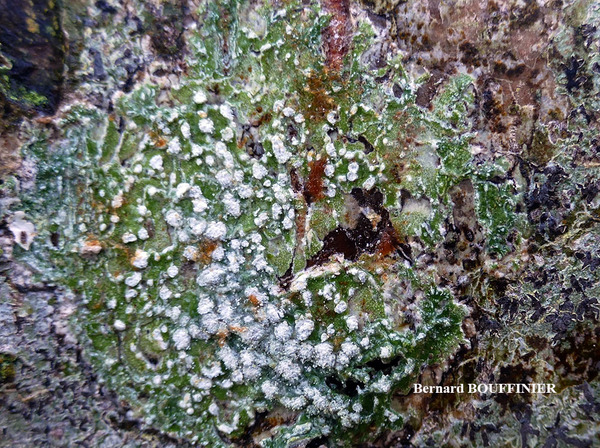
Bernard Bouffinier - Source: http://www.lichensmaritimes.org/index.php?task=fiche&lichen=440&lang=en
France, Dineault
Growth form: Crustose
Substrata: bark
Photobiont: green algae other than Trentepohlia
Reproductive strategy: mainly asexual, by soredia, or soredia-like structures (e.g. blastidia)
Most common in areas with a humid-warm climate (e.g. most of Tyrrenian Italy)
Commonnes-rarity: (info)
Alpine belt: absent
Subalpine belt: absent
Montane belt: rare
Dry submediterranean belt: extremely rare
Humid submediterranean belt: very rare
Padanian area: absent
pH of the substrata:
| 1 | 2 | 3 | 4 | 5 |
Solar irradiation:
| 1 | 2 | 3 | 4 | 5 |
Aridity:
| 1 | 2 | 3 | 4 | 5 |
Eutrophication:
| 1 | 2 | 3 | 4 | 5 |
Poleotolerance:
| 0 | 1 | 2 | 3 |
Altitudinal distribution:
| 1 | 2 | 3 | 4 | 5 | 6 |
Rarity
absent
extremely rare
very rare
rare
rather rare
rather common
common
very common
extremely common
Loading data...
Occurrence data
Predictive map

P.L. Nimis; Owner: Department of Life Sciences, University of Trieste
Herbarium: TSB (9478)
2002/05/14

Bernard Bouffinier - Source: http://www.lichensmaritimes.org/index.php?task=fiche&lichen=440&lang=en
France, Dineault



